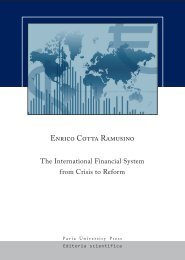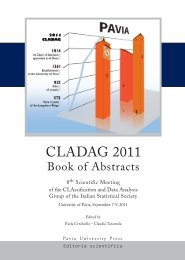The Palestinian Economy. Theoretical and Practical Challenges
The Palestinian Economy. Theoretical and Practical Challenges
The Palestinian Economy. Theoretical and Practical Challenges
Create successful ePaper yourself
Turn your PDF publications into a flip-book with our unique Google optimized e-Paper software.
332<br />
Di Maio – N<strong>and</strong>i<br />
variables included in the full specification (i.e. Column 3, Table 5). 15 This approach<br />
allows for the possibility of different channels being simultaneous at work. <strong>The</strong><br />
magnitude of second stage coefficient thus only gives an indication of the relative impact<br />
of different channels.<br />
We begin our analysis considering the effect the number of closure days on four<br />
aggregate level labour market indicators: the average market wage <strong>and</strong> unemployment<br />
rate in WB <strong>and</strong> the average (low-skilled) wage <strong>and</strong> unemployment rate at the district<br />
level. Results reported in Table 6 show that the number of closure days has a significant<br />
effect only on the (low-skilled) district average market wage (lower panel of Column 3,<br />
Table 6). <strong>The</strong> latter is a measure of the tightness of the labour market <strong>and</strong> a proxy for the<br />
child’s opportunity cost of not working. 16<br />
<strong>The</strong> first stage coefficient thus captures the effect of the conflict on the local labour<br />
market: the average low-skilled wage decreases with the number of closure days. From a<br />
theoretical point of view, a change in local average market wage is predicted to have two<br />
opposite effects on child labour (<strong>and</strong> school attendance): the income <strong>and</strong> the substitution<br />
effect. <strong>The</strong> former prevails when a lower market wage increases child labour. This is<br />
the case when the child works for reaching a given level of consumption. On the<br />
contrary, the substitution – or own price effect – prevails when an increase in the<br />
market wage – the opportunity cost of not working – induces the child to work more.<br />
As shown in the upper panel of Table 6, the lower the (low-skilled) district average<br />
market wage the higher the probability of child labour. <strong>The</strong> result clearly indicates that<br />
in West Bank the income effect prevails, with children working as a response to a<br />
worsening of the economic conditions induced by the conflict. In addition, closures also<br />
marginally reduce school attendance.<br />
Next we consider four household-level channels through which a change in the<br />
intensity of the conflict may have an impact on child labour <strong>and</strong> school attendance.<br />
15 <strong>The</strong> predicted value from the first stage regression is a measure of the explained component of the second<br />
stage regressor due to variation in the number of closure days. <strong>The</strong> predicted value is correlated with the<br />
number of closure days but not with the unexplained component of children’s time allocation choice. Hence<br />
the effect on children’s status can be thought as due to changes in the second stage regressor induced by the<br />
variation in the number of closure days.<br />
16 To measure the child’s opportunity cost of not working, the obvious c<strong>and</strong>idate would be the average child<br />
wage at the district level. This was not possible due to the extremely low number of observations on child<br />
wage in our dataset. Instead we use the average wage of private sector workers with less than 7 years of<br />
education. Note that the average father’s years of education in our sample are 10. Wages are in constant 1996<br />
New Israeli Shekels (NIS), obtained by deflating nominal wages by the Consumer Price Index in West Bank<br />
provided by the PCBS.
















